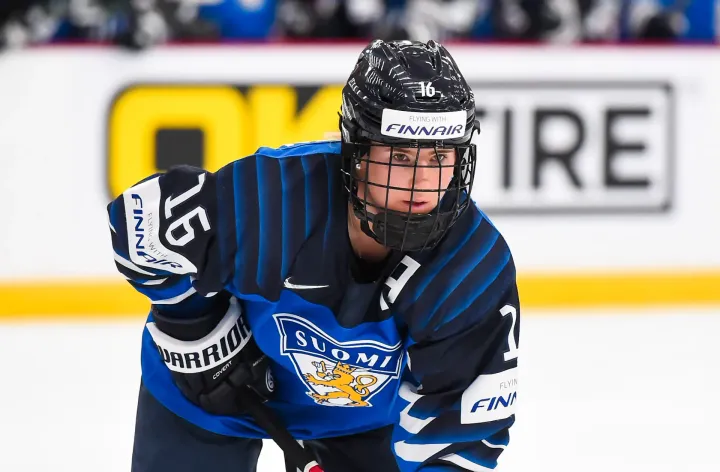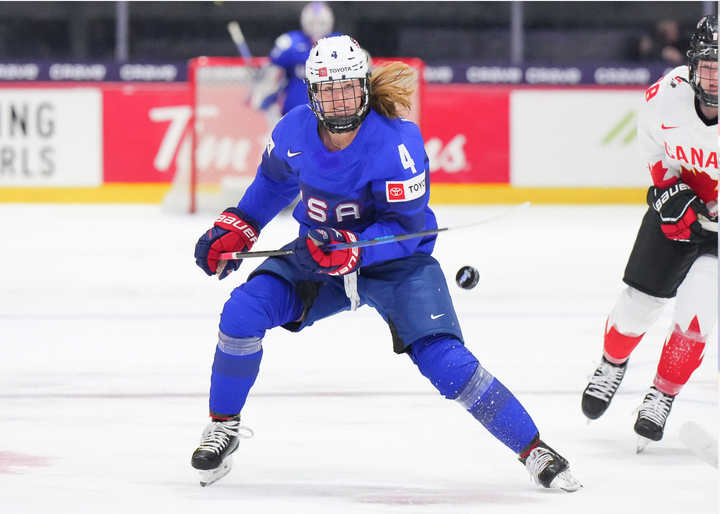The Takeaway: Wisconsin tops the nation again
That’s a wrap on the 2020-21 college hockey season!
With another NCAA season in the books, here are some part thoughts at season’s end.
Five things to know
Wisconsin wins their second national title in a row: After a very exciting tournament in Erie, Pa., the Badgers ended the season as national champions once again, knocking off Northeastern 2-1 in overtime. The Huskies, who were playing for their first title, gave Wisconsin a great fight all game long, generating some chances off the rush and preventing too many grade-A chances for the Badgers.
But overall, I thought this was a perfectly managed game on Wisconsin’s part. The Badgers needed to keep Northeastern’s attackers to the perimeter and stay strong in front of goaltender Kennedy Blair to prevent second-chance opportunities. They did exactly that; a feat that’s all the more impressive to me considering Northeastern coach Dave Flint mentioned in his first intermission interview that his team needed to get to the middle more often and pick up rebounds and loose pucks. Clearly, the Huskies were conscious of it and tried to make the adjustment, but the Badgers prevented them from doing so for much of the game.
The game was scoreless for practically three periods, but Makenna Webster, eventually named Most Outstanding Player, picked up a rebound and put the Badgers ahead with nine minutes left. Northeastern, who’s carved out an identity as a team that is never out of it, came right back to tie it. But midway through overtime, Daryl Watts scored a pretty unbelievable goal to win it for Wisconsin; she had lots of time behind the net to make a play and decided to try and bank it off of goaltender Aerin Frankel. Instead, it hit the Northeastern defender and popped in the net.
"Daryl Watts wins the national championship for Wisconsin!"
— Wisconsin Hockey (@BadgerWHockey) March 21, 2021
Hear @brian_posick's call of Daryl Watts' game-winning goal!#WFrozenFour || #OnWisconsin pic.twitter.com/Jr29OO4Gj9
Wisconsin’s D as a whole was a bright spot in this game. Grace Bowlby was named a First Team All-American on Friday and deserves all the accolades she gets, but this was an outstanding game and a well-deserved victory for the entire D corps. Chayla Edwards, Natalie Buchbinder, and Nicole LaMantia all turned in really solid performances to break up Northeastern rushes, quickly get out of the zone, and keep plays alive in the Huskies’ zone when needed. LaMantia’s slide to block Chloé Aurard’s shot in overtime was, in hindsight, one of the biggest plays of the game.
Postgame quips: Things were understandably a little fuzzy for Watts after scoring the winner, what with all the mayhem following the sudden-death championship victory. When describing the goal in the aftermath on the ESPNU broadcast, she said she thought it went in off of Frankel. She didn’t find out until the postgame presser that it actually went in off the defender. Her response was a classic: “No way! O.K. Well, I’m pretty tired now, so.” Same, Daryl.
TIG managing editor Michelle Jay also posed a question to the Twitterverse that got me thinking about other funny Frozen Four postgame moments. The two that come to mind are both courtesy of Clarkson. In 2018, Élizabeth Giguère scored this ridiculous breakaway goal to win the national championship for Clarkson in overtime. After the game, she explained:
“I just saw the defense cutting to the middle and I was like, ‘I need to put pressure’ at that point. I just won that battle, then I was alone with the goalie and I kind of blacked out, like I can’t really remember what happened. It went on the net and that’s all that matters,” she said.
Head coach Matt Desrosiers immediately followed up: “I wish I could make plays like that when I black out.”
Back in 2014, Clarkson pulled off arguably the biggest upset in NCAA Tournament history to win their first title over the Minnesota Gophers. Senior captain Carly Mercer came out for the press conference wearing her championship hat backwards. After the presser wrapped up, a reporter told her, “Carly, you’re supposed to show off the logo.” Carly’s response: “Yeah, I know, but I’ve got big ears.”
Patty Kaz top three announced: USA Hockey announced last week that Northeastern’s Aerin Frankel, Wisconsin’s Daryl Watts, and Minnesota’s Grace Zumwinkle are this year’s top-three finalists for the Patty Kazmaier Memorial Award. I don’t mean any disrespect at all to these three finalists, but I was pretty shocked to see Alina Müller left off the list. She is the best player in college hockey; I think that much is obvious to anyone who watches her play. She’s consistently Northeastern’s most dangerous forward and makes things happen pretty much every shift.
There’s no such thing as a perfect player, but Müller does everything so well, and at such an elite level, that she is about as perfect as you can get. Sometimes I wonder if that ends up hurting her. She’s clearly received recognition in college hockey at large and from the Patty Kazmaier Award committee in particular; she was named a top-three finalist in both 2019 and 2020. It still feels a little like we’re holding her to past standards for herself, and not necessarily judging her against the current field. And while it might be fair to say that she was a touch less dominant this year by her standards, she was still the best player on the ice on any given night.
I think we’re starting to head down the road of Marie-Philip Poulin treatment with Müller. Poulin is another player who did so many things extremely well. Her individual skills are above and beyond the competition, but it’s hard to pinpoint one specific thing she excels at because she does it all so well. Müller is the same way. If you pulled any one aspect of her game out and gave it to a random player (her shot, her skating, her drive, her stickhandling, her vision) that player would definitely stand out, and likely be known as a great shooter or a great playmaker. For Müller, all of those pieces of her game are so legitimately elite; there isn’t just one thing that sticks out.
Poulin is an apt comparison and a slightly troubling one to me — she never won this award throughout her career at BU. I know it’s too early to start worrying about the same thing happening to Müller, but I’m worried anyway. A European player has never won the Patty Kaz, and while there have been others who were certainly deserving, Müller has probably the strongest case of any so far. It’s hard to fathom that she could play her entire NCAA career without winning it, but she’s already three years in.
Alina Mueller just doing Alina Mueller things pic.twitter.com/ZjXWRDRMTt
— The Ice Garden (@TheIceGarden) March 20, 2021
Questions for next season: The 2020-21 season is barely in the books, but I can’t help thinking of next year already. This was an incredibly strange year for college hockey, and there’s going to be some repercussions that continue to shake things up next year. For one, we were missing two-thirds of the ECAC, which is top-to-bottom the best league in the country. In a normal year, the ECAC is not a one-bid tournament team. Looking ahead, what can we expect of Cornell and Princeton, who were both preseason top-fives this year? There was a lot to like about St. Lawrence over the course of their shortened season this year — what will we see from the Saints next year? How much will the conference standings change after what was basically a gap year for eight teams?
And beyond the ECAC — who will opt to use the extra year of eligibility granted to them due to COVID? Which schools will even allow it? How will it affect the incoming class of freshmen players? How much will the gauntlet of Olympic qualifying rounds in the fall affect players’ availability — and how many North American players will be tapped for centralization?
We’re already seeing player movement thanks at least partially to the extra year of eligibility granted due to the pandemic. Wisconsin just won a national championship with Lacey Eden playing on the second line; Eden was initially a Princeton commit who went to play for the Badgers instead due to the Ivy League canceling their season. Clair DeGeorge just announced that she’s transferring to Ohio State and playing her fifth year for the Buckeyes. There could be more shakeups still to come.
Related
SB Nation’s Women’s College Hockey Division I Poll: On Wisconsin, Again
Anniversary of the inaugural NCAA championship: This past Tuesday was the 20th anniversary of the first-ever NCAA women’s hockey championship game, played in 2001. Minnesota Duluth won it over St. Lawrence. 20 years feels like far away, but in context, it’s barely any time at all. The NCAA men’s hockey championship was first played in 1948. It’s a sordid reminder that NCAA women’s hockey is still in its infancy, and we are still building the sport up to all it can be — all while doing it in the shadow of a men’s game that gets the bigger share of media attention, infrastructure, and resources.
I also want to point out that 2001 simply marks the first year that the NCAA sanctioned a women’s hockey championship. Women have obviously been playing hockey for much longer than that, and women’s college hockey in particular predates the NCAA adding the sport to its varsity roster. It’s really important, to me, that we don’t erase the contributions of the players from the ‘70s and ‘80s and ‘90s. Women’s college hockey has a long and storied history; it’s just the (somewhat) deeper degree of institutional support that’s new to the past two decades.





Comments ()